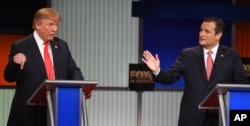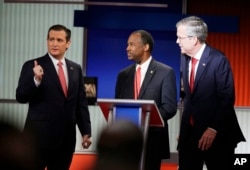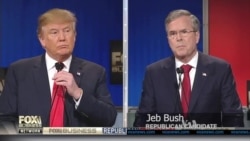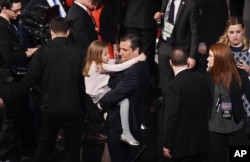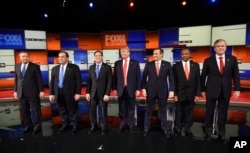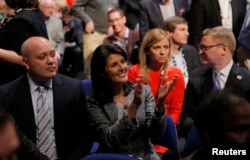Billionaire American real estate mogul Donald Trump and Texas Senator Ted Cruz have for months acted more like partners than rivals, as they compete to become the Republican Party's nominee for U.S. president.
But at Thursday's Republican presidential debate in South Carolina, the men who occupy the top two positions in most national public opinion polls were anything but friendly towards each other.
During the 2½-hour nationally televised debate, Trump and Cruz repeatedly clashed, at times getting emotional, as they tried to win the support of voters upset at the GOP establishment.
Cruz also engaged in a series of feisty exchanges with Florida Senator Marco Rubio, a fellow Cuban-American who is appealing to a broader segment of the party and who is coming in third in most polls.
The other four candidates on stage – New Jersey Governor Chris Christie, Ohio Governor John Kasich, retired neurosurgeon Ben Carson, and ex-Florida Governor Jeb Bush – struggled to make their mark.
Three-man race?
"There were three winners of this debate: Rubio, Trump and Cruz," said Ford O'Connell, a Republican strategist and former campaign advisor for Senator John McCain's 2008 presidential campaign.
The debate did not do much to change the perception that the Republican field is narrowing, O'Connell told VOA.
"At the rate things are going, it seems like we're heading for a three-man race," he said.
That is also the assessment of Tucker Eskew, a veteran political strategist from South Carolina and a former deputy assistant to former president George W. Bush.
"[After this debate] I think we will have seen some hardening of support for the major candidates, and perhaps a softening of support for those falling out of the top three or four," Eskew told VOA.
Trump-Cruz clashes
What is less clear, however, is who came out on top in the confrontations between Trump and Cruz, a fight that was long-anticipated.
Cruz has for months refused to criticize Trump, fearful that if he does, he may alienate the reality TV star's supporters who he hopes to eventually attract.
The animosity between the two men has recently increased after Trump raised the question of whether Cruz is qualified under the constitution to become president, since he was born in Canada to a Cuban father and an American mother.
There was some evidence Trump's attack was working: many recent polls in Iowa, which holds the nation's first nominating contest in less than three weeks, show Cruz losing support after weeks of gaining ground on the real estate magnate.
On Thursday, it was clear that Cruz has had enough. Addressing the controversy, he accused Trump of political opportunism in bringing up the issue about his birth.
"You know, back in September, my friend Donald said that he had had his lawyers look at this from every which way, and there was no issue there. There was nothing to this birther issue," Cruz said.
Watch video report from VOA's Jim Malone:
"Now, since September, the Constitution hasn't changed. But the poll numbers have," the Texas senator added.
In response, the blunt-speaking Trump acknowledged he was raising the issue "because now [Cruz] is doing a little better." He also repeated his assertion that there is a "serious question" about whether Cruz meets the constitutional requirement of being a "natural born citizen."
"There's a big question mark over your head, and you can't do that to the party," Trump said. "Who the hell knows if you can even serve in office?"
'New York values'
In another particularly spirited exchange, Cruz repeated his campaign trail accusation that Trump has "New York values," something he hopes will make him seem out of touch with traditional conservatives.
"Not a lot of conservatives come out of Manhattan. I'm just saying," said Cruz.
Trump quickly hit back, defending New Yorkers that he said responded "beautifully" to the September 11, 2001 terror attacks.
"We rebuilt downtown Manhattan, and everybody in the world watched and everybody in the world loved New York and loved New Yorkers. And I have to tell you, that was a very insulting statement that Ted made," Trump said, to applause.
Who won?
"That was a powerful moment and one that did not work well for Cruz," according to Eskew. But overall, he says the Trump-Cruz exchanges were a "mixed bag," with neither side coming out on top.
"Ted Cruz certainly did a far better job and got a much-needed win on the birther issue," according to O'Connell. "Though I've got to say that Trump back-handed pretty hard with the New York values [accusation]."
Chip Felkel, another political strategist based in South Carolina, told VOA the long-awaited bout between the two frontrunners "didn't disappoint."
"Trump to me tonight was a little bit more reserved. He also got booed twice, which I thought was interesting," Felkel said. "I would have to say that Cruz probably got the better of Trump."
The debate took place in South Carolina, in a region of the country where Trump could have difficulty winning enough support once the voting begins. Trump's debate performance may be emblematic of his wider struggles in the south, Felkel said.
"Trump is a lot of things. I think more than anything, for some people, he's an entertainer," Felkel said, noting Cruz's popularity with evangelical Christians and other social conservatives.
"And I think as we get closer to this primary, people are starting to notice that he's saying a lot but he's not saying a lot. It's time to get serious here. I do think that may cause him some problems," he added.
Cruz-Rubio clash
Cruz also worked to fight off a series of attacks from Rubio, who accused his colleague from Texas of changing positions on several key issues involving immigration.
"You used to say you supported doubling the number of green cards, now you say that you're against it. You used to support a 500 percent increase in the number of guest workers, now you say that you're against it," Rubio said.
"You used to support legalizing people that were here illegally, now you say you're against it. You used to say that you were in favor of birthright citizenship, now you say that you are against it," he added.
Cruz hit back: "I appreciate you dumping your oppo (opposition) research folder on the debate stage there," he said.
"It's your record!" Rubio responded.
Criticism of Obama, Clinton
The candidates also took aim at the man they hope to replace: President Barack Obama.
One of the president's fiercest critics was Governor Christie, who promised to "kick [Obama's] rear end out of the White House" and who at one point referred to the president as a "petulant child."
Another prominent focus in the debate was Democratic presidential frontrunner Hillary Clinton.
Bush brought up the scandal over Clinton's use of a personal email server during her time as secretary of state, saying it could distract her if she becomes president.
"If she gets elected, her first 100 days instead of setting an agenda she might be going back and forth between the White House and the courthouse," Bush said, to applause.
Bush, who was once seen as a favorite of the GOP establishment, has steadily lost support, and now finds himself near the bottom in most opinion polls.
Once the voting starts, he and other candidates in the lower tier could start dropping out quickly, according to analysts.
"But I don't think we're going to see any drop out until either New Hampshire or South Carolina," O'Connell cautions. "Once you've made this type of commitment, you might as well go through with it."





